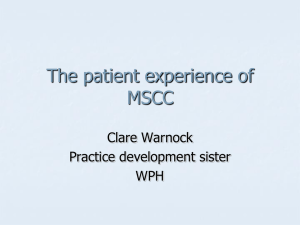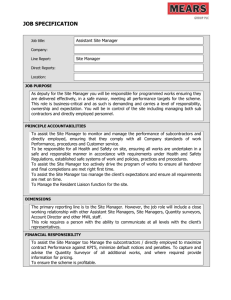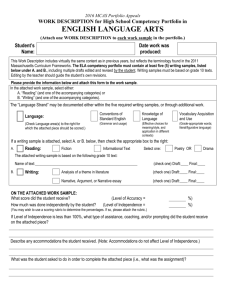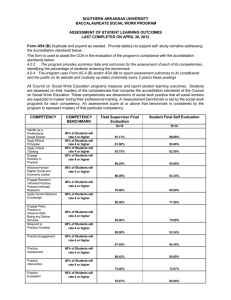ENGL 0810 (Section #) Learning Support Writing Semester and Year
advertisement
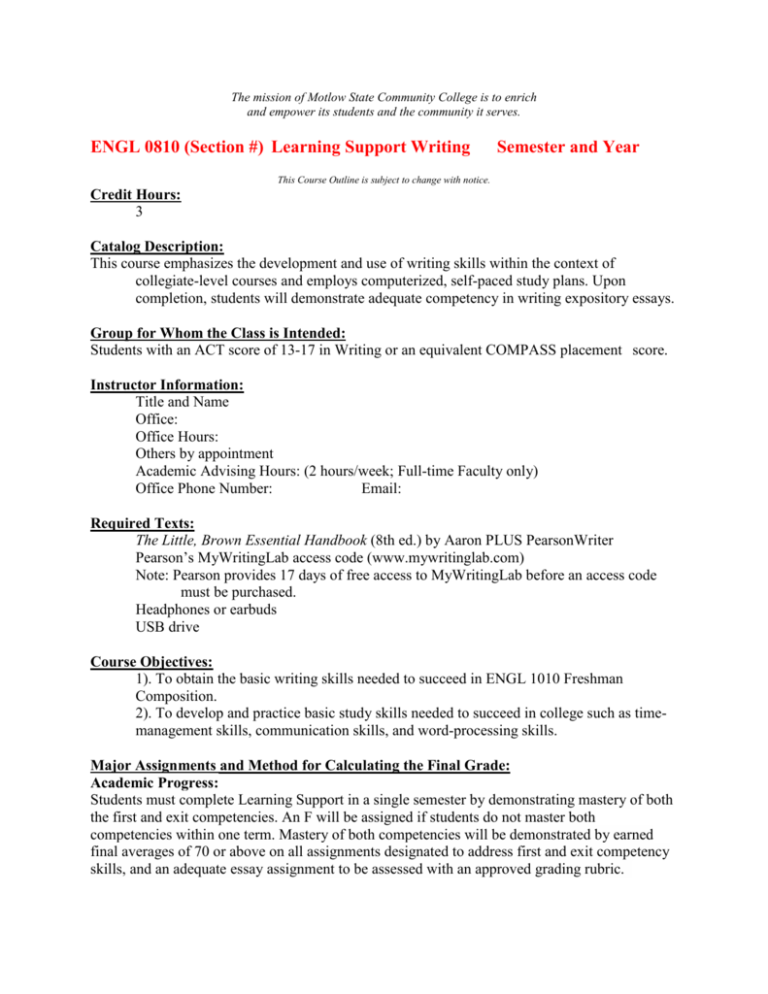
The mission of Motlow State Community College is to enrich and empower its students and the community it serves. ENGL 0810 (Section #) Learning Support Writing Semester and Year This Course Outline is subject to change with notice. Credit Hours: 3 Catalog Description: This course emphasizes the development and use of writing skills within the context of collegiate-level courses and employs computerized, self-paced study plans. Upon completion, students will demonstrate adequate competency in writing expository essays. Group for Whom the Class is Intended: Students with an ACT score of 13-17 in Writing or an equivalent COMPASS placement score. Instructor Information: Title and Name Office: Office Hours: Others by appointment Academic Advising Hours: (2 hours/week; Full-time Faculty only) Office Phone Number: Email: Required Texts: The Little, Brown Essential Handbook (8th ed.) by Aaron PLUS PearsonWriter Pearson’s MyWritingLab access code (www.mywritinglab.com) Note: Pearson provides 17 days of free access to MyWritingLab before an access code must be purchased. Headphones or earbuds USB drive Course Objectives: 1). To obtain the basic writing skills needed to succeed in ENGL 1010 Freshman Composition. 2). To develop and practice basic study skills needed to succeed in college such as timemanagement skills, communication skills, and word-processing skills. Major Assignments and Method for Calculating the Final Grade: Academic Progress: Students must complete Learning Support in a single semester by demonstrating mastery of both the first and exit competencies. An F will be assigned if students do not master both competencies within one term. Mastery of both competencies will be demonstrated by earned final averages of 70 or above on all assignments designated to address first and exit competency skills, and an adequate essay assignment to be assessed with an approved grading rubric. Grading: Your final grade will be based on the following grading scale: A (90-100%), B (80-89%), C (7079%), F (Below 70%). The chart below shows how this grade will be calculated. 15% Letter #1 (may fulfill Assessment 1) Due: T 2/10 35% Process Portfolio Due: R 3/5 30% Letter #2 (may fulfill Assessment 2) Due: R 4/16 20% MyWritingLab Post-Test In-class R 4/30, or earlier *Please note: You must demonstrate mastery of all Exit Competencies in Letter #2 in order to pass this class. Letter #1: In this one-page letter of recommendation, you will demonstrate mastery of the First Competency. See prompt and rubric for details. Process Portfolio: You will submit a portfolio demonstrating how you used all parts of the writing process to complete an essay assignment for your Composition I class. The items in your portfolio should demonstrate invention, drafting, revision, and editing. Your portfolio should also include a one-page memo summarizing your overall writing process and explaining the significance of each included piece. See prompt, rubric, and sample portfolio for further details. MyWritingLab Pre- and Post-test: During the first week or two of class, students will take a MyWritingLab diagnostic pre-test. The results of this pre-test will determine which MyWritingLab modules each student needs to study. Students will work through these individualized study plans at their own pace. You are encouraged to finish early! Once students have finished all assigned modules, they will take the MyWritingLab post-test, which is the final for this course. Competencies: Over the course of this semester, students must demonstrate mastery of both the First Competency and the Exit Competency. Students will complete a minimum of two short writing assignments this semester, and these will be graded with the Competency Rubric. Ideally, students will demonstrate mastery of the First Competency in Letter #1 and mastery of the Exit Competency in Letter #2. If mastery is not achieved, additional writing tasks will be assigned. First Competency: Students will demonstrate limited/developing competence in writing expository essays. • Task/Purpose: Address the assigned writing task and have a discernible purpose that is sustained throughout most of the text. • Audience Awareness: Display awareness of the audience and the requirements of the writing situation, and maintain that awareness with some consistency. • • • • • Organization: Have a discernible and logical organization. The organization may be simple, with a basic thesis statement, topic sentences, and transitions, but the reader is able to discern an overall logical progression of ideas. Support: Provide logical support for the thesis and main ideas, but may display some weaknesses in evidence provided. Language Skills: Display some variety in sentence structure, vocabulary, and level of formality appropriate to the purpose, audience, and context. Grammar and Punctuation: Display basic control of surface features such as basic syntax, grammar, punctuation, word choice, and spelling, particularly those errors that interfere with a reader’s understanding. The writing may display some grammar and punctuation errors, but not consistent patterns of serious errors. Writing Process: Reflect the use of basic strategies for generating ideas, drafting, revising, editing, and proofreading, although students may still be in the process of developing an individualized and highly effective writing process. Exit Competency: Students will demonstrate adequate competence in writing expository essays. • Task/Purpose: Fulfill the requirements of the assigned writing task and have a clear purpose that is sustained throughout the text. • Audience Awareness: Respond adequately and appropriately to the needs of the audience and the requirements of the writing situation. • Organization: Be logically organized in support of the text’s purpose with a clear thesis statement and topic sentences, supporting points that are presented in a logical progression, and appropriate transitions. • Support: Provide logical and adequate support for the thesis by employing appropriate rhetorical strategies/patterns and, when appropriate, integrating material from primary and/or secondary sources. • Language Skills: Display variety in sentence structure, vocabulary, and level of formality appropriate to the purpose, audience, and context. • Grammar and Punctuation: Display competent control of surface features such as basic syntax, grammar, punctuation, word choice, and spelling, particularly those errors that interfere with a reader’s understanding and/or undermine the writer’s authority. • Writing Process: Reflect the use of effective strategies for generating ideas, drafting, revising, editing, and proofreading. Course Organization: On the first day of class, I will split you up into two groups, the Conference Group A and Conference Group B. On your conference day, come prepared to work on a draft or revision of a writing assignment for this class or your English 1010 class. On your “off” day, you will work on your assigned MyWritingLab modules. You are required to come to class on your conference day every week, even if you don’t have a 1010 writing assignment due soon! Course Policies: Attendance Policy: It is a very good idea to attend all class meetings over the course of the semester. In- class assignments like reading quizzes and short writing assignments cannot be made up and this can seriously impact your final grade. (Exception: if your absence is an excused absence, i.e. you are sick and have a doctor’s note or you were on a field trip for another class, I will allow you to make up missed class work for credit.) If you do miss class, it is your responsibility to first get in touch with a classmate to copy any notes you missed and second to get in touch with me regarding anything else you may have missed. (Please note: If your absences are the result of extenuating circumstances, please send me an email or come speak with me after class.) Academic Misconduct Policy: Plagiarism, cheating, and other forms of academic dishonesty are prohibited. Students guilty of academic misconduct, either directly or indirectly, through participation or assistance, are immediately responsible to the Instructor of the class. Based on their professional judgment, Instructors have the authority to impose the following academic sanctions: (a) require the student to repeat the assignment for full or partial credit; (b) assign a zero, an F, or any other grade appropriate for the assignment or examination; (c) assign an F for the course. For more information, see MSCC Policy 3:02:00:03. Classroom Misconduct Policy: The Instructor has the primary responsibility for maintenance of academic integrity and controlling classroom behavior, and can order temporary removal or exclusion from the classroom of any student engaged in disruptive conduct or conduct that violates the general rules and regulations of the institution for each class session during which the conduct occurs. Extended or permanent exclusion from the classroom, beyond the session in which the conduct occurred, or further disciplinary action can be effected only through appropriate procedures of the institution. Disruptive behavior in the classroom may be defined as, but not limited to, behavior that obstructs or disrupts the learning environment (e.g., offensive language, harassment of students and professors, repeated outbursts from a student which disrupt the flow of instruction or prevent concentration on the subject taught, failure to cooperate in maintaining classroom decorum, etc.), text messaging, and the continued use of any electronic or other noise or light emitting device which disturbs others (e.g., disturbing noises from beepers, cell phones, palm pilots, lap-top computers, games, etc.). Class Cancellation Policy: If class is cancelled for any reason, you will be notified via our D2L page and will be told there how to prepare for the next class period. Emergency Procedures Policy: In case of a medical emergency we will immediately dial 9-911 and report the nature of the medical emergency to emergency response personnel. We will try to stay with the person(s) in need and maintain a calm atmosphere. We will talk to the person as much as possible until response personnel arrive on campus, and we will have someone go outside to meet emergency personnel and direct them to the appropriate location. In the event of an emergency (drill or actual), a signal will be sent. Based on that signal, students will follow the procedures below for that specific type of emergency: Loud warbling sound throughout Building (FIRE) Collect purses and coats and proceed immediately out of your room and exit through the closest emergency exit. Proceed to the Designated Assembly Area closing windows and doors as you exit. Remain there until the "All Clear" Signal is given by an Emergency Management Team member. (Instructors- Provide your Designated Assembly Area, and its location to students) Tornado Siren (SEVERE WEATHER): Proceed to the closest designated severe weather shelter on the 1st floor and proceed all the way into the shelter. Crouch down on the floor with your head between your knees facing away from the outside walls. Remain there until the "All Clear" Signal is given. (Instructors- Provide the recommended room number or hallway location to students) Air Horn (1 Long Blast) and Face to Face All Clear (INTRUDER/HOSTAGE): Ensure door is closed, locked and lights turned off. If your door will not lock, move some tables and chairs in front of the door quickly. Move immediately to the rear of the room away from the door and sit on the floor- out of sight if possible. Remain calm and quiet and do not respond to any inquiries at the door unless you have been given the "All Clear" and a member of law enforcement or your campus Emergency Management Team member makes face-to-face contact at your door. Classroom Locked-door Policy: In order to adhere to MSCC Emergency Preparedness Policy and to facilitate effective classroom management, the classroom door will remain closed and locked for the duration of the class period. Food and Drink Policy: As we will be meeting in a computer classroom, no food or drink will be allowed. Educational Technology: Accessing Campus Computers or the MSCC Library from off Campus: Your Username format is your First Initial, Last Name and Month and Day Birthday in the Format of MMDD. Example: Marcia Smith born on April 11, 1992 - Username: msmith0411. Your Pin will be the numeric pin you created when you initially applied to Motlow College. Using D2L: For help with D2L including how to submit materials to a Dropbox, see this page: http://www.mscc.edu/techtube.aspx Technical Support/Assistance: Students having problems logging into a course, timing out of a course, using course web site tools, or any other technical problems, should contact the MSCC Technology Help Desk at 931-393-1510 or toll free 1-800-654-4877, Ext. #1510 (or d2lhelp@mscc.edu) Disability Services/Accommodations: Motlow College is committed to meeting the needs of qualified students with disabilities by providing equal access to educational opportunities, programs, and activities in the most integrated setting appropriate. This commitment is consistent with the College's obligations under Section 504 of the Rehabilitation Act of 1973 and the American with Disabilities Act of 1990 (ADA). Together, these laws prohibit discrimination against qualified persons with disabilities. To this end, the Director of Disability Services for Motlow College coordinates services and serves as an advocate and liaison for students with disabilities attending Motlow College. Contact the Director of Disability Services here: http://www.mscc.edu/disability/index.aspx. Students with disabilities who would need assistance in an emergency evacuation should self-disclose that need to the instructor no later than the second day of class or second group meeting. Confidentiality of Student Records (FERPA Policy): The education records of current and former students at Motlow State Community College are maintained as confidential records pursuant to The Family Educational Rights and Privacy Act (FERPA) of 1974 as amended. For further information, see MSCC Policy No. 3:02:03:00. Student Success: Writing Center Tutoring: During our conferencing time in this course, you’ll be able to work with me, your instructor, and a Writing Center tutor that comes to our class. You can also schedule a tutoring session and take any writing assignment for any class to the Writing Center for extra help! The Writing Center offers one-on-one sessions with knowledgeable, attentive tutors. They can assist you with any writing project at any stage in the writing process. While they are happy to help you improve any individual assignment, the ultimate goal is to help you become a more confident, competent college writer! In Smyrna, the Writing Center is located in the Student Success Center in SM-STH. You can make an appointment by going to mscc.mywconline.com Academic Advisement: MSCC Instructors can guide students to specific resources regarding Advisement. For additional help, see the Academic Advisement page: http://www.mscc.edu/advisement/index.aspx Smarthinking: Students may receive online tutorials for the English course essays via Smarthinking. After submitting a completed essay to Smarthinking, students may have their work reviewed and critiqued by an “e-structor” who will provide a personalized-response to the student (typically, within 24 hours). Students may access Smarthinking here: http://www.mscc.edu/smarthinking.aspx Tutoring: MSCC Instructors can guide students to specific resources regarding Tutoring in their discipline. For additional help, see the Student Success page: http://www.mscc.edu/student_success/index.aspx Academic Advisement: MSCC Instructors can guide students to specific resources regarding Advisement. For additional help, see the Academic Advisement page: http://www.mscc.edu/advisement/index.aspx Important Note about Learning Strategies: Supplementary modules in MyWritingLab address study skills and learning strategies. Mini-lectures covering test taking, note taking, organizational tools, and college resources may also be presented. Class Daily Schedule of Assignments: (MWL= MyWritingLab) Week 1: Introductions Conf. Group Topic Class 1 n/a Introductions Class 2 n/a Writing Center Visit PearsonWriter MyWritingLab MWL Progress + Other Due Dates Week 2: Writing Process Basics Class 1 n/a MWL Diagnostic Test MyProjects Print-Out Due Class 2 A+B Writing Process Basics MWL: Complete SS1: Time Management & SS2: Coping with Stress and Anxiety Week 3: Understanding Prompts and Rubrics Class 1 A Understanding Prompts & Rubrics Rhetorical Triangle Class 2 B Grammar and Mechanics: Why They Matter! MWL: Complete SS3: Concentrating When You Read and Study & SS6: Effective Note Taking Week 4: Integrating and Citing Sources Class 1 A Integrating Sources Class 2 B MLA Format and Citation **LETTER #1 DUE** Week 5: Review of Process Portfolio Assignment Class 1 A+B Class 2 Review of Process Portfolio MWL: Complete W1.1-1.2 NO CLASS Week 6: Building Body Paragraphs Class 1 A Progress Conference #1 Class 2 B Building a Body Paragraph MWL: Complete W1.3-1.6 Week 7: Thesis Statements Class 1 A Thesis Statements MWL: Complete W1.7-1.11 Class 2 B Thesis Statements Continued **PROCESS PORTFOLIO DUE** Week 8: Essay Organization Class 1 A Essay Organization Class 2 B Progress Conference #2 MWL: Complete W2.1-2.6 Week 9: Planning and Revising with Outlines Class 1 A Planning with Outlines Class 2 B Revising with Outlines MWL: Complete W2.7-2.11 Week 10: Revision and Editing Tools Class 1 A Revision & Editing Tools Class 2 B Revision & Editing Tools Continued Week 11: Tone and Style MWL: Complete W3.1-3.4 Class 1 A+B Class 2 Tone and Style MWL: Complete W3.5-3.8 NO CLASS Week 12: Gifts to Your Audience Class 1 A Gifts to Your Audience MWL: Complete W4.1-4.3 Class 2 B Progress Conference #3 **LETTER #2 DUE** Week 14: Avoiding Unintentional (and Intentional!) Plagiarism Class 1 A Plagiarism Prevention Workshop Class 2 B Paraphrasing and Summarizing Weeks 14-15: Wrapping Up! Wrapping up MWL Post Test MWL: Complete W4.4-4.5
